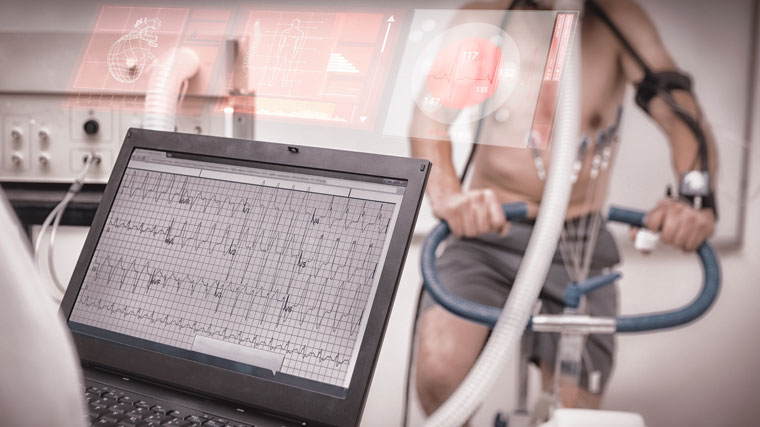Stress Test Often First Step In Diagnosing Major Cardiac Issues

Answer a few questions and we'll provide you with a list of primary care providers that best fit your needs.
The last thing a cardiac stress test should cause is stress or anxiety.
A stress test is a study that is done to help a doctor determine whether restricted blood flow to your heart is the reason for your symptoms, which can range from chest pain to shortness of breath. The test is painless, nearly risk-free, and lasts only a few minutes. Many patients, however, approach it with unnecessary anxiety due to misconceptions, says cardiologist Aaron Kaibas, DO.
“If your doctor tells you that he or she is concerned you may have coronary artery disease, that can cause anyone to have anxiety,” says Dr. Kaibas. “Couple that with inaccurate information about the test from unreliable sources and some of our patients can sometimes be already stressed before they even start the test.”
What a Stress Test Is
A stress test is named not for your emotional state, but rather the condition in which your heart is placed during the test, to get an accurate picture of its health. Dr. Kaibas says a stress test has two basic components: exerting the body and monitoring or imaging the heart.
Exertion is created by having you walk on a treadmill. This helps raise your heart rate and blood pressure while the heart is monitored with an EKG. Imaging is then obtained using nuclear medicine and, in some cases, ultrasound.
“Our hearts are constantly requiring a certain amount of oxygen and blood flow, and if we exert ourselves, then our heart requires more,” Dr. Kaibas says. “In a resting state – such as when a person is lying in a bed or sitting in a chair – the heart doesn’t require as much. In fact, even those with significant coronary artery disease may not have any symptoms and their EKG may look completely fine (while at rest).”
He adds that stress tests should be ordered only by a physician or advanced practice provider and should not be conducted for critically ill patients who have advanced cardiac issues. And, ideally, they should not be ordered for individuals who lack crucial heart disease symptoms or risk factors.
You can put yourself at ease by approaching a stress test with the following in mind:
- Stress tests are conducted with your health in mind. A stress test requires the heart to undergo exertion in order to provide the most accurate results. But, not everyone’s health makes it possible to walk on a treadmill for even a short amount of time. If you are physically limited in your ability to exert yourself, you can be given medication to simulate physical exertion.
- Stress tests are medically supervised. Most stress tests are performed with a physician or advanced practice provider in the room as your heart rate, blood pressure, and oxygen levels are constantly monitored. This allows the test to be conducted with little risk.
- Stress tests are relatively brief. The average stress test requires you to be on the treadmill for five to seven minutes. The most common side effects are shortness of breath and nausea. These mild symptoms quickly go away once the test is completed, Dr. Kaibas says.
- Stress tests provide a clear starting point for diagnosing your condition. Stress tests are relatively accurate in diagnosing the presence of coronary artery disease, but they often serve as the first step in understanding your condition. Further testing is usually required to pinpoint the exact cause and appropriate treatment.
Answer a few questions and we'll provide you with a list of primary care providers that best fit your needs.
Source: Aaron Kaibas, DO, Premier Cardiovascular Institute






